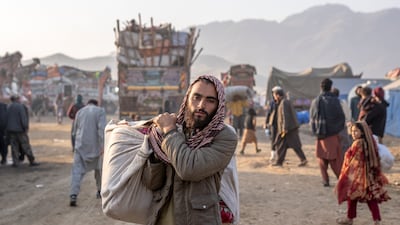Hundreds of thousands of undocumented Afghan refugees have left Pakistan in a deportation process as police used mosque loudspeakers to urge them to go voluntarily.
More than 200,000 have so far left Pakistan, UNHCR spokesman for Pakistan Qaiser Khan Afridi told The National.
The UN's refugee agency is looking into the cases of Afghan asylum seekers who may face threats to their lives in Afghanistan if they are deported, he said.
“Singers, musicians and ex-servicemen are those who badly need asylum as their lives may be threatened under the incumbent Taliban government in Afghanistan,” Mr Afridi said.
On Sunday, in Gulbahar locality of Peshawar, a mosque loudspeaker was used by a policeman to tell Pakistanis to expel Afghan tenants.
“We ask all undocumented Afghans to leave Pakistan voluntarily or face legal action,” it said. “We also warn Pakistanis to expel Afghan tenants from their homes and shops or else they will also be punished as per the laws.”
The city is known to have hosted the Afghans in huge numbers since the 1979 Soviet invasion of the country and heavy fighting in the 1980s.
“Pakistan hosts around 1.3 million Afghans who have already been granted PoR (Proof of Registration) cards in the years 2006-2007 and they are under UNHCR mandate," said Mr Afridi.
“Also, there are about 840,000 Afghans who got their Afghan Citizen Cards in 2017. Both these groups are allowed to stay in Pakistan. However, the refugees who do not have any of these cards are being deported.”
Mr Afridi said the agency asked the government not to deport the refugees this way. He said it remained to be seen whether the government of Pakistan extended the cards and stay of the registered refugees.
Support for departing refugees
Ali Shinwari, a resident of Khyber Pakhtunkhwa province’s Landikotal area that hosts one transit camp for the refugees, told The National that local people and social welfare organisations were helping the refugees.
“They are offering money, clothes and foods as we believe they badly need our assistance during these trying times,” he said.
Muhammad Essa Azimi, an Afghan who moved to Afghanistan recently, told The National that a family has to spend at least three to four days on the dusty roads during the repatriation from Pakistan to their native Afghanistan.
“We are happy with how the people of Pakistan treated us. Many even offered cash and other support to the departing Afghans; our neighbours were very sad when we were leaving Pakistan,” Mr Azimi said.
“I left Pakistan before the October 31 deadline. When we reached Torkham, the Pakistan border authorities just stamped our hands and identity documents on the border gate before we entered Afghanistan.”

He said once a family entered Afghanistan, they were given cash and a food ration for six months.
Those from faraway areas such as Helmand and others wait in camps set up by Afghan authorities for two days for rations and money before heading to their native areas.
“Upon entering Afghanistan, I went to my native home in Nangarhar and returned to Torkham after two days to collect ration and money as it is a short distance,” Mr Azimi said.
Rifaqat Khan, deputy director of the Khyber Pakhtunkhwa Home Department that manages the deportation programme, told The National that the government arranged transport for the refugees up to the Torkham border, but not for their belongings.
“Those refugees who wish to take their household luggage or cattle have to arrange their deportation on their own expense. However, if they wish to move single-handedly, the government vehicles take them up to the border,” he said.
“Authorities are trying to facilitate the refugees and treating them well. But there are huge crowds and the deportation process continues till 9pm daily. At least 6,000 refugees crossed the Torkham border in a single day on Sunday.”
Sit-in at Chaman border
At the Pakistan-Afghanistan border in Chaman, Balochistan province, residents have staged a sit-in under the banner of All Parties Tajir Ittehad (All Parties Traders Alliance) for the past two weeks in protest against the Pakistani government's decision to allow the cross-border movement on passports only.
Speaking to The National, alliance spokesman Olasyar Khan said about 30,000 Pakistanis crossed the Chaman border daily to work at their shops located in Spin Boldak area of Afghanistan and returned home in Pakistan at evening.
“Since 1893, when this region was cut off from Afghanistan and included in the subcontinent, people from both sides of the border, mostly traders, have used just their Pakistani identity cards and Tazkirah (Afghan ID) at the border, but the government of Pakistan has banned the movement on ID cards since November 1 and now the movement is allowed only on passports,” he said.
“Besides the restoration of the old mode of border movement, we also demand that refugees be treated as per the UN charter and agreements, which does not allow their continuing deportation.”
He said the Chaman border is referred to as the shashmahi (six months) border because many families in the area spend six months of the year in Pakistani areas and half of the year on the Afghan side as they have homes on both sides.

